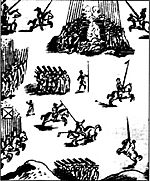Battle of Jaquijahuana facts for kids
Quick facts for kids Battle of Jaquijahuana |
|||||||
|---|---|---|---|---|---|---|---|
| Part of the Spanish conquest of Peru | |||||||
 |
|||||||
|
|||||||
| Belligerents | |||||||
| Viceroyalty of Peru | Nueva Castilla | ||||||
| Commanders and leaders | |||||||
| Pedro de la Gasca Alonso de Alvarado Francisco Hernández Girón Pedro de Valdivia |
Gonzalo Pizarro (POW) Francisco de Carvajal (POW) |
||||||
| Strength | |||||||
| 1,600, including 400 cavalry | 900, 6 guns |
||||||
| Casualties and losses | |||||||
| 1 dead | 15 dead, ~800 defected or captured |
||||||
The Battle of Jaquijahuana was a big fight in Peru on April 9, 1548. It happened between the forces of Gonzalo Pizarro and Pedro de la Gasca. This battle was part of a larger conflict called the Revolt of the Encomenderos. This was a time when Spanish leaders in Peru were fighting among themselves.
Contents
Why Did the Battle Happen?
After the Spanish took control of the Inca Empire, there was a lot of trouble. Important Spanish leaders like Francisco Pizarro and Diego de Almagro were no longer in charge. Many strong commanders were gone because of power struggles.
New Laws and New Leaders
In 1542, King Charles of Spain made new rules called the New Laws. These laws were meant to protect the native people of Peru. The King also sent a new governor, Blasco Núñez Vela, to Peru. He was the first viceroy, which is like a royal governor. His job was to make sure the New Laws were followed.
Gonzalo Pizarro's Rebellion
Gonzalo Pizarro was a brother of Francisco Pizarro. He did not want to give up the power his family had in Peru. He gathered many supporters who also disliked the New Laws. These laws meant that powerful Spanish settlers, called encomenderos, would lose some of their control over native workers.
Blasco Núñez Vela arrived in Lima, the new capital, in 1544. He soon had Gonzalo Pizarro's rival, Cristóbal Vaca de Castro, sent back to Spain. But Gonzalo Pizarro fought back. He removed Blasco Núñez Vela from power and sent him away.
The Battle of Añaquito
Blasco Núñez Vela was later set free and came back to Peru. He claimed he was the true viceroy. He and Gonzalo Pizarro gathered their armies. They fought at Añaquito in 1546. Gonzalo Pizarro had more soldiers and better weapons. He won the battle, and Blasco Núñez Vela was killed. This made Gonzalo Pizarro the main power in Peru.
Pedro de la Gasca Arrives
The King of Spain then sent a new person, Pedro de la Gasca, to Peru. De la Gasca was very smart. He arrived in 1547 with a small army. He started to win over Gonzalo Pizarro's supporters. He promised to forgive anyone who had gone against the King. He also said he would not strictly enforce the New Laws. This made many encomenderos switch to his side.
The Armies Gather
The two armies came close to fighting in late 1547 near Cuzco. This area was called Jaquijahuana (also known as Xaquixaguana or Sacsahuana). De la Gasca avoided a battle at first. He used this time to convince even more of Pizarro's officers to join him. One famous person who switched sides was Alonso de Alvarado.
When they first arrived, Gonzalo Pizarro had a much bigger army. But as time passed, many of his soldiers left him. By the time the final battle happened in April 1548, Gonzalo Pizarro's army was much smaller. Their spirits were also very low.
The Battle of Jaquijahuana
The battle itself was a big defeat for Gonzalo Pizarro. De la Gasca's army barely lost any soldiers. It is said they only had one person die.
Gonzalo Pizarro and his most loyal commander, Francisco de Carvajal, were captured during the fight. They were both put to death.
After the battle, Pedro de la Gasca worked to make sure the King of Spain was fully in charge of Peru again. Peru remained a Spanish colony for a long time, until the early 1800s.
See also
 In Spanish: Batalla de Jaquijahuana para niños
In Spanish: Batalla de Jaquijahuana para niños
 | Audre Lorde |
 | John Berry Meachum |
 | Ferdinand Lee Barnett |

